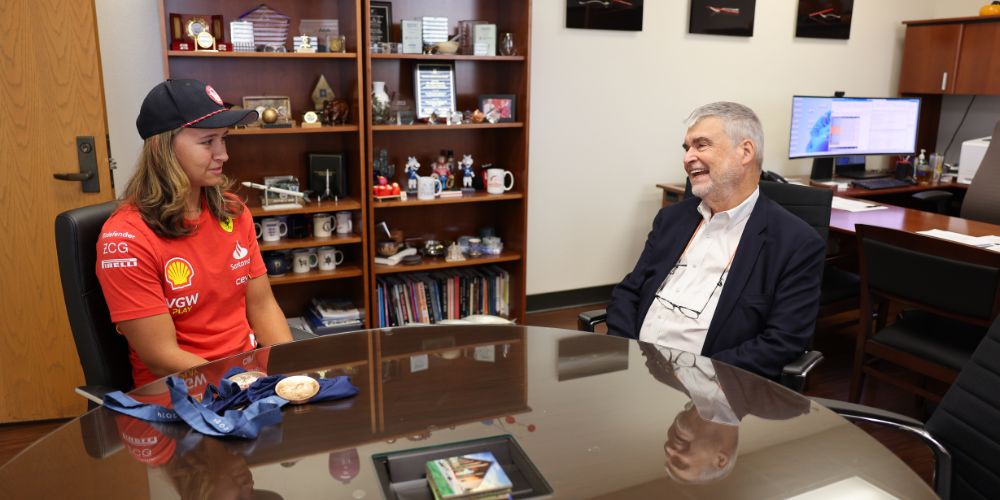UTA student among Olympic medalists

UTA aerospace engineering student Austen Smith reached the highest levels of shooting sports when she competed at the 2021 Olympic Games in Tokyo. Three years later at the 2024 Paris Games, she claimed her first Olympic medals, earning bronze in women’s skeet shooting and silver in mixed team skeet shooting.
Now, Smith has returned to campus to pursue her dream of working for NASA or an aerospace company to design supersonic aircraft.
“I’ve always loved science,” she said. “I was obsessed with the solar system when I was little, and I’ve lived near DFW International Airport all my life, so I’ve always been interested in planes. My big dream is to work on X planes, like the X-59.”
Smith didn’t begin shooting until she was 12 years old. She wasn’t good at team sports, but her father noticed that she had great hand-eye coordination when she played video games, so he took her to a shooting range because he thought she might be good at it. From the moment she hit her first target, she was hooked.
In 2017, at age 14, she earned a silver medal in her first junior World Championships, followed by a bronze in 2018, before earning gold in 2019. She won the International Shooting Sport Federation (ISSF) Junior World Cup in 2019 and finished 10th in skeet at the Tokyo Olympic Games. Many more medals followed in World Cup, Pan American Games and ISSF World Championship competitions, topped by her medals at the Paris Olympics.
“There’s no age limit to my sport. It all depends on the mental aspect and your willingness,” Smith said. “I’ll be able to take time off to finish my degree and still try to qualify for the 2028 Olympics. I have thought about completing my set of medals with a gold.”
Being at UTA has made it easier to work toward her degree. The campus is close to her home and her practice range, and she has found the faculty friendly and accommodating.
“I couldn’t have continued to compete and gone to class without my professors’ support,” Smith said. “They’ve done all they could to help me, including allowing me to take an exam during office hours. I’ve heard from some of my teammates that not every university is that helpful.”
“There are a lot of things from shooting that transfer well to college,” she continued. “Shooting is all about consistency and discipline. Practice is everything, and the repetition of practice rounds is a lot like doing homework problems over and over. I can relate high-stress situations in class, like an exam, back to competition.”
Although she is committed to being a full-time college student, Smith recognizes that she is an important spokesperson for her sport and wants to help the next generation of athletes realize their dreams. Her success on the world stage has given her a platform, and she is working to help junior shooters develop their skills to take over when her career is done.
“I feel like it’s my duty to give back to an extent. I don’t want my sport to die out, so I do try to work with younger kids, and a lot of national team members are doing the same thing,” she said.
“I’ve had a couple of instances where people recognize me out in the community, but I’m still doing what I’ve always done—I go to class, go to the gym, etc. I have had a couple of opportunities open up since I’ve been back to try to be a good advocate for the sport, and I’m doing my best to pass on my knowledge.”
— Written by Jeremy Agor, College of Engineering